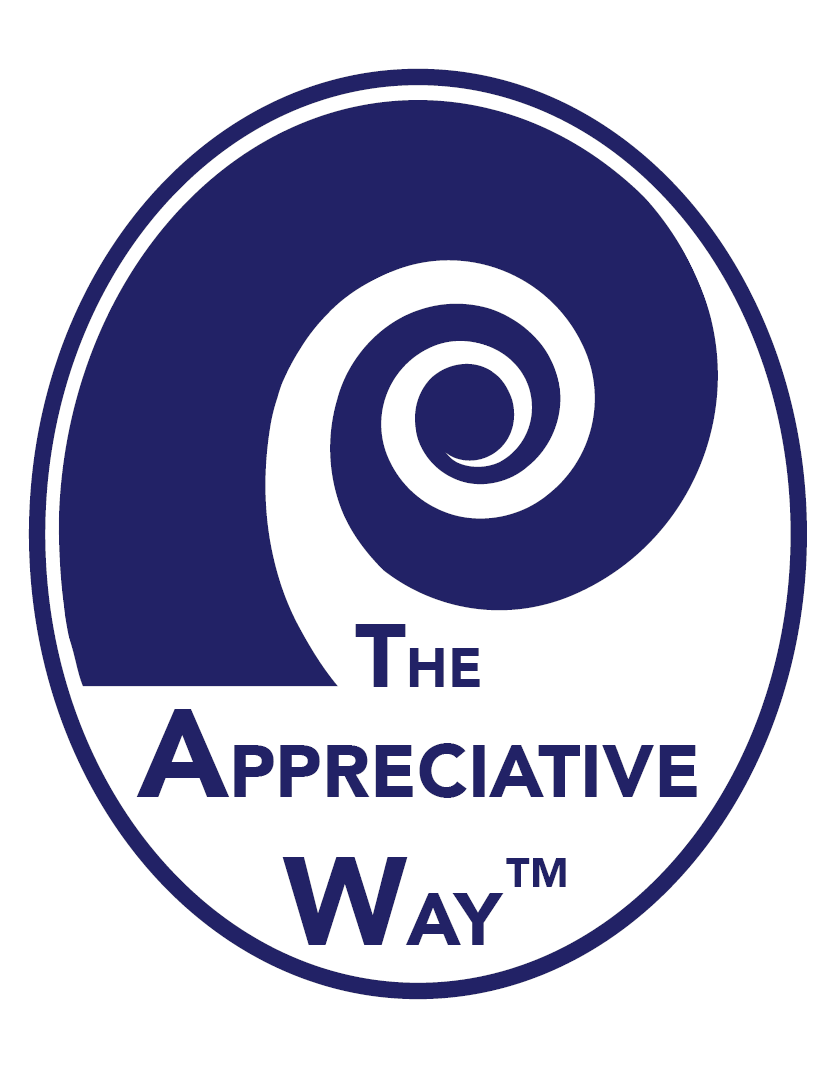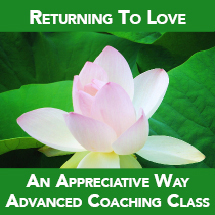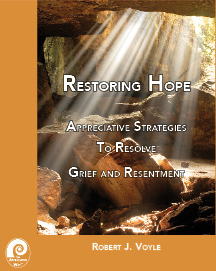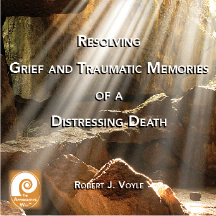

Restoring Hope
Practical Appreciative Inquiry based strategies to effectively resolve grief and resentment.
What Readers Say
This book is a gold mine of practical methods to make things better.
Ed Leidel, Episcopal Bishop and Congregational Coach serving North America.
Rob Voyle has produced the most comprehensive manual for dealing with the consequences of serious negative life events.
Andy Austin, author, The Rainbow machine: Tales from a Neurolinguist's Journal.
Restoring Hope Video
Watch author Rob Voyle help a client resolve traumatic grief using the strategies outlined in his book: Restoring Hope.
Director of Training
- Episcopal priest
- Psychologist
- Executive Coach
- Helpful, Humorous, and Healing
Rob is an accomplished speaker and trainer. Participants consistently rate his training programs as:
"one of the best workshops I've attended in years"
>>
See Rob's Helpful,
Humorous, and Healing
approach to training
Stay Connected
Receive The Appreciative Way our Free Email Newsletter
and receive advance notice of future programs.
Privacy: We never rent, sell, or share your email.
What Participants Say
Rob's training is full of heart, wit, and passion.
E.R. Executive Coach
Rob's combination of organizational savvy, teaching skills, theological & spiritual integration, and ability to rapidly build supportive, learning communities is quite simply the best in any of
the churches today.
Gray Temple, Episcopal Priest, Author & Coach
After 45 years in the pastoral ministry and attending three events led by Rob Voyle, I have finally learned a better way to help church leaders help themselves and the people they serve.
John Wilkerson, Director: Church Leadership Coaching & Consulting
Rob will enhance your ability to delight in yourself, your neighbor and God through his insightful, practical, loving, professionally grounded, appreciative and often mischievous coaching and
teaching skills; and that will make you a better leader and citizen in God's creation.
Ed Leidel, Episcopal Bishop and Congregational Coach serving North America
"I have been fully engaged emotionally, intellectually, and spiritually. Thank you for touching me at the core of my being."
M.E. Member of the UCC Church.
"Of all the training I have been to, your notes are the ones I keep coming back to time and again for practical resources."
P.W. Conference Pastor.
Rob's educational model brings body, mind and spirit together. I have been challenged intellectually, transformed spiritually, touched emotionally, gathering in communally. He came into my life at just the right time.
Jean Holmes, Presbyterian Pastor
Stay Connected
Receive The Appreciative Way our Free Email Newsletter
and receive advance notice of future programs.
Privacy: We never rent, sell, or share your email.
Webinar: Returning to Love:
Coaching Clients to Grow From Fear To Love
An 8 week Advanced Coaching Online Class
Learn appreciative strategies coaching clients to:

- Move from a fear to love based faith
- Discover, clarify, and live from a place of core purpose and passion
- Learn the nature of anxiety and how to grow from fear to love
- Rebuild their self-image after personal failure
- Respond compassionately to criticism and bullying
- Resolve performance degrading critical self-talk
Webinar Schedule: Returning To Love: Coaching Webinar
No Returning To Love: Coaching Webinar webinars are scheduled at this time.
Please see training schedule for a complete listing of all webinar programs
Our webinar programs provide:
- 24/7 Access to online class recordings.
- Live tutorials for consultation and application.
- Individual and virtual team learning.
- Full access to workshop participant resources.
- A new way of thinking about old ways of doing things
Returning to Love: Appreciative Strategies to Grow from Fear to Love
In a sermon on the Sunday after the 9/11 terrorist attacks the Rev. Chris Rankin-Williams said:
The challenge of this life is not to stay alive.
The challenge of this life is stay in love.
Staying in love is a challenge and many clergy, coaches and psychologists have often heard parishioners and clients say: "I know it in my head but I need to have it in my heart."
In this training program you will learn specific strategies to help people move from a head knowledge to a heart knowledge that they are loved and can live in love. Specifically participants will learn and practice helping people:
Recommended Text
This program is an extension of Rob Voyle's book Restoring Hope: Appreciative Strategies to Resolve Resentment and Grief. You can purchase it a the The Appreciative Way Bookstore.
Program Content and Focus: Imagineering
Since coaching is about creating a preferred future and everything we think about the future is an act of pure imagination, coaching often involves helping a client to use their imagination to rehearse and create their desired outcomes. In this advanced coaching class we focus primarily on learning the techniques and strategies of imagineering or how to help clients change both the content and the structure of their experiences to develop their internal resources as they work to create their desired future.
The term "Imagineering" was first used by Walt Disney in describing the work of the imagination in the creative process. It has subsequently been used by coaches to describe the techniques of using and restructuring the imagination in role rehearsal and practice exercises.
The Structure of Experience
There are two major aspects to the way people process, store and retrieve their experiences: the content of their experience and how they structure or represent the content. For example: when a preacher says "I can't imagine being able to preach like that," there are two things for the coach to pay attention to: "what" the person is trying to imagine (preaching in a certain way) and "how" they are actually trying to imagine preaching in a certain way. Some preachers might be relying on visual images of themselves preaching whereas others may be relying on auditory images and actually be imagining hearing them self preach. A more accurate statement of "I can't imagine being able to preach like that," would be: "I can't see myself being able to preach like that," or "I can't hear myself being able to preach like that."
Similarly we have often heard people say something like:
"I know it in my head but I need to know it in my heart!"
In this example the client knows something (the content) and it is in their head (the structure) as intellectual knowledge. What they want is to restructure it as an experience in their heart. Most coaching is oriented toward modifying the content of a person's experience, yet in this example changing the content or what a person knows in their head will typically not result in a change in their desired heart felt sense of self. Just getting someone to think confident thoughts will not help a person to feel confident.
In this Advanced Coaching class you will learn and practice strategies to change the structure of client's experience to create fast and sustainable change.
Course Schedule
Weekly Teleconference for 10 weeks: Check Webinar Schedule for the specific times and dates.
Course Work: 1.5 hours of written and recorded online class that is completed prior to the tutorial.
The material is presented online and can be accesed at anytime during the program
Tutorial:Conference call for just-in-time consultation, reflection on reading, and group exercises.
Course Outline
Week 1: Review of the Appreciative Way of Coaching
Setting Desired Outcomes and Positive Goals.
Ensuring Sustainability, Seeking and Satisfying Objections.
Identifying Core Passion.
Week 2: Discovering and Associating Resources:
Understanding How People Represent Their Experiences.
Distinguishing the Content and Structure of Experience
Associating Resources to Needs.
Week 3: The Language of Change:
Using the Client's Language and Metaphors.
The language of Being Stuck.
Discovering the Direction for Next Steps.
Week 4: Crazy Gods Make People Crazy:
Identifying Core Perspectives on Nature of God.
The 7 Questions For Discernment.
I Know it in My Head But I Need to Know it in My Heart .
Week 5: Rebuilding Self-Image:
The Nature of Self-Image.
Rebuilding Self-Image Following Failure.
Resolving Shame.
Week 6: Resolving Anxiety States:
The Nature of Anxiety.
Resolving Anxiety.
Resolving Phobia.
Week 7: Resolving Critical Voices and Self-Talk:
Creating an Internal Environment of Compassion.
Resolving Familial Voices of Derision.
Resolving Critical Self-Talk.
Week 8: Synthesis and Integration:
Developing Your Expertise.
Additional Resources.
Next Steps.
Learning Objectives
- Review and integrate skills and knowledge acquired in the Introduction to Appreciative Inquiry and Introduction to Coaching programs:
- Apply the Appreciative Way synthesis of Appreciative Inquiry, Milton Erickson's strategies of change, and Contemplative Spirituality to the task of executive and personal coaching:
- Distinguish coaching from psychotherapy, pastoral counseling, spiritual direction, mentoring, consulting, and knowing when to refer client's to competent professionals in these disciplines to help client's achieve their goals:
- Know the limits of your professional ability to coach ethically within the scope of your professional competence:
- Provide clients with informed consent, risks and benefits of coaching, limits of confidentiality, and potential need to refer to other professionals as part of developing a coaching contract:
- Use the A to B model of coaching to create specific positive coaching goals congruent with the client's values:
- Ensure that goals are ecologically sustainable with respect to the client's physical, psychological, and spiritual functioning and are just with respect to the external world the client inhabits:
- Identify whether a client needs to "grow" internal personal resources or develop and manage external resources to achieve their goals:
- Use the overt content and underlying assumption of questions to create and use powerful coaching questions:
- Paradoxically utilize the power of resistance to transform "stuck states:"
- Discover how clients uniquely organize and structure their internal experience such as memories of past experience and imagine their future:
- >Use a variety of strategies to modify how clients structure their internal experiences to associate resources to personal challenges to create resourceful states and maximize performance:
- Create internal resources to enable clients to remain grounded and engaged, rather than resentful or avoidant, in the presence of people who violate the client's values:
- Create resourceful states to resolve performance anxiety:
- Use appreciative coaching strategies to transform or resolve internal conflicts and critical voices that diminish performance:
- Use appreciative strategies to rebuild self-image and self-esteem following personal or professional failure:
- Discover and use an individual client's core passion and purpose and their spiritual understanding to create highly resourceful and motivated states:
- Identify patterns of transformation such as the "crazy wisdom" of Buddhist masters and know how to use them with clients:
- Use confusion to destabilize "stuck states" to create opportunities for transformation:
- Listen and directly respond to a client's idioms and metaphoric communication, especially in regard to client's communication about being stuck and unable to move:
- Know how and when to create and use client specific parables to create opportunities for transformation:
- Use the Metaphors of Movement coaching process described by Andrew Austin to expand the coaching understanding of "next steps" and "moving forward" to include the six possible directions a person may need to "take a step:"
- Discover and use a client's non-rational internal wisdom to discern future courses of action that are aligned with core values and purpose:
Who Should Attend This Program
Not Just For Clergy
Our Advanced Coaching Training is open to:
- Clergy who want to develop their coaching skills.
- Psychologists, Consultants, and Counselors who are also clergy or who work with clergy.
- Spiritual Directors and Chaplains
- Leaders who coach or mentor staff and volunteers.
- Psychologists, Counselors and Coaches who want to work as Executive or Life Coaches.
- Coaches who want to work in the business world in a way that honors their values and spirituality.
Webinar Schedule: Returning To Love: Coaching Webinar
No Returning To Love: Coaching Webinar webinars are scheduled at this time.
Please see training schedule for a complete listing of all webinar programs







